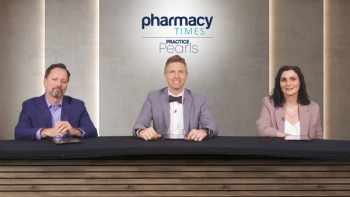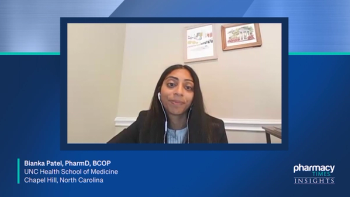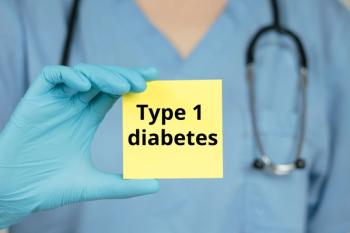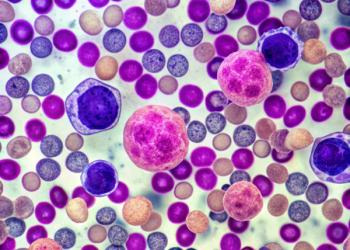
Samantha Picking, PharmD, senior director of immunizations at Walgreens, shares how pharmacy teams are addressing vaccine misinformation, managing coadministration, and supporting test-to-treat services during a complex respiratory season.

Samantha Picking, PharmD, senior director of immunizations at Walgreens, shares how pharmacy teams are addressing vaccine misinformation, managing coadministration, and supporting test-to-treat services during a complex respiratory season.

Panelists discuss how the SUNLIGHT trial's success stems from its methodical design with robust single-arm and randomized phase two data that earned NCCN guideline inclusion before the phase three study, comprehensive quality of life data collection, and straightforward methodology, while acknowledging that the absence of consensus definitions for clinically meaningful outcomes in refractory metastatic colorectal cancer forces providers to rely on individual thresholds when evaluating hazard ratios, confidence intervals, and safety profiles, with the additional challenge that different organizational frameworks (ASCO, ESMO) use varying criteria for progression-free survival and overall survival endpoints, making consistent trial interpretation difficult without standardized consensus definitions.

A panelist discusses how pharmacists play a critical role in tyrosine kinase inhibitors treatment evaluation by addressing patient concerns about dosing, administration, and drug interactions while helping assess efficacy, safety, and tolerability through their knowledge of treatment guidelines, individual drug profiles, and adverse effect management strategies to optimize therapy selection and monitoring for each patient's specific circumstances and comorbidities.

Panelists discuss how multidisciplinary care for refractory metastatic colorectal cancer involves collaborative decision-making through tumor boards, specialized oral oncology pharmacists for financial assistance and patient support, transitions of care teams, and independent pharmacist-patient conversations that often reveal concerns patients won't share with prescribers, while emphasizing that balancing survival extension with quality of life requires understanding individual patient desires and life goals, incorporating patient values into treatment decisions by assessing their tolerance for side effects and supportive care burden, and recognizing that what's clinically meaningful to providers may differ significantly from what matters most to each individual patient.

An expert shares how 340B puts independent pharmacies at a competitive disadvantage.

Samantha Picking, PharmD, senior director of immunizations at Walgreens, discusses staffing strategies, digital tools, and operational improvements designed to streamline flu vaccination services during the upcoming respiratory season.


Morgan Cantley, PharmD, BCOP, shares key insights about the HER2-targeting antibody-drug conjugate trastuzumab deruxtecan.

Scott A. Soefje, PharmD, MBA, BCOP, FCCP, FHOPA, discusses how Medicaid payment changes could impact rural hospitals and local pharmacies, noting the importance of pharmacists staying involved as the situation develops.

Panelists discuss how common barriers to implementing trifluridine/tipiracil plus bevacizumab combination therapy include complex pill burden management with multiple bottle strengths that can confuse patients during dose reductions, procedural complications requiring bevacizumab holds that patients sometimes fail to disclose in advance, and hypertension management challenges that create patient anxiety about treatment delays, while emphasizing that adherence support strategies include close monitoring with biweekly visits, written dosing calendars, alternative five-day dosing schedules aligned with infusion timing, and incorporating patient-reported outcomes into shared decision-making to optimize treatment success despite these practical barriers.

Panelists discuss how real-world dose adjustment decisions in metastatic colorectal cancer are primarily driven by individual patient factors rather than package insert recommendations, emphasizing the importance of understanding each patient's goals, values, comorbidities, and tolerance thresholds through collaborative multidisciplinary decision-making, since patients frequently ask "how will this make me feel?" and often prioritize quality of life over strict adherence to standard dosing, with the key insight that dose reductions can maximize efficacy by keeping patients on therapy longer rather than causing treatment discontinuation from intolerable toxicities.

A panelist discusses how social determinants of health including low health literacy, economic instability, housing and transportation issues create significant barriers to tyrosine kinase inhibitor adherence and patient engagement in underserved chronic myeloid leukemia populations, leading to higher cancer-related mortality rates, while pharmacists can help bridge these gaps through tailored education, advocacy for assistance programs, and innovative care delivery methods like virtual visits.

Pharmacists help connect patients with the correct resources and help remove barriers so patients can receive continuous care.

Pharmacists can educate patients and health care professionals in addition to coordinating lab orders, interpreting results, and guiding patients through the next steps.


Jennifer Goldman, PharmD, CDCES, BC-ADM, FCCP, explains the different stages of type 1 diabetes, teplizumab’s use, and emphasizes the pharmacist’s role in care.

Panelists discuss how managing common toxicities in combination therapies requires specific strategies including dose reductions and growth factor support for neutropenia with trifluridine/tipiracil, antihypertensive management for blood pressure elevations across different agents, and careful patient selection considering contraindications such as previous pelvic radiation (GI perforation risk), cardiac conditions, anticoagulation therapy (hemorrhage risk), hepatic impairment, advanced age, and complex pill burden management, emphasizing the importance of multidisciplinary care and selecting conscientious patients capable of adhering to precise dosing requirements.

Panelists discuss how the SUNLIGHT trial's demonstration that adding bevacizumab to trifluridine/tipiracil improves overall survival and progression-free survival represents the best available data in refractory colorectal cancer, with quality of life findings showing longer time to definitive deterioration being particularly significant for patient counseling since patients in third-line and beyond settings prioritize both survival benefit and maintaining good quality of life, making this combination compelling as it provides efficacy improvement without dramatically compromising patient well-being.

A panelist discusses how financial burdens and insurance limitations impact chronic myeloid leukemia treatment decisions, with newer drugs like asciminib facing approval challenges despite recent FDA approval, while pharmacists can help overcome these obstacles by educating patients about assistance programs, advocating for access, and helping navigate the complex health care system to ensure sustainable long-term therapy options.

Panelists discuss how pharmacists are vital in ensuring personalized care for patients with tardive dyskinesia by fostering continuous, secure communication and collaboration with health care teams across various practice settings.

Panelists discuss how pharmacists enhance treatment adherence in older adults with tardive dyskinesia by assessing cognitive function, involving caregivers, linking medication to daily routines, providing personalized education, and utilizing tailored technological reminders to support consistent and manageable medication use.

Sundar Jagannath, MBBS, highlights pharmacists’ expanding role in managing linvoseltamab’s immunologic profile, supporting adverse event response, and advancing multiple myeloma care.

Eileen Peng, PharmD, discusses how her team has restructured pharmacy services to support outpatient administration of CAR T-cell and bispecific therapies—emphasizing multidisciplinary collaboration, early toxicity management, real-world data integration, and pharmacist-led care transitions to ensure safety and continuity across care settings.

Two pharmacy leaders at UNC Health share how their distinct yet complementary leadership journeys and skill sets are driving innovation in clinical practice, education, and team development across the health system.

LeAnne Kennedy, PharmD, BCOP, CPP, FHOPA, FASTCT, discusses the collaborative culture, research opportunities, and leadership pathways that define oncology pharmacy practice at Atrium Health Wake Forest Baptist, while emphasizing the importance of advocacy and visibility for the profession.

Maximizing pharmacists’ impact on medication safety requires removing barriers to intervention and empowering proactive clinical roles.


A panelist discusses how accessing tyrosine kinase inhibitors for chronic myeloid leukemia treatment faces multiple barriers including financial challenges from insurance coverage and rising drug costs, prior authorization requirements, social barriers like transportation and health literacy issues, and practical obstacles such as the need to manually request refills for specialty oncology medications.

Decentralized pharmacists play a critical role in reducing medication errors by collaborating in real time with physicians and nurses to enhance patient safety across care settings.
